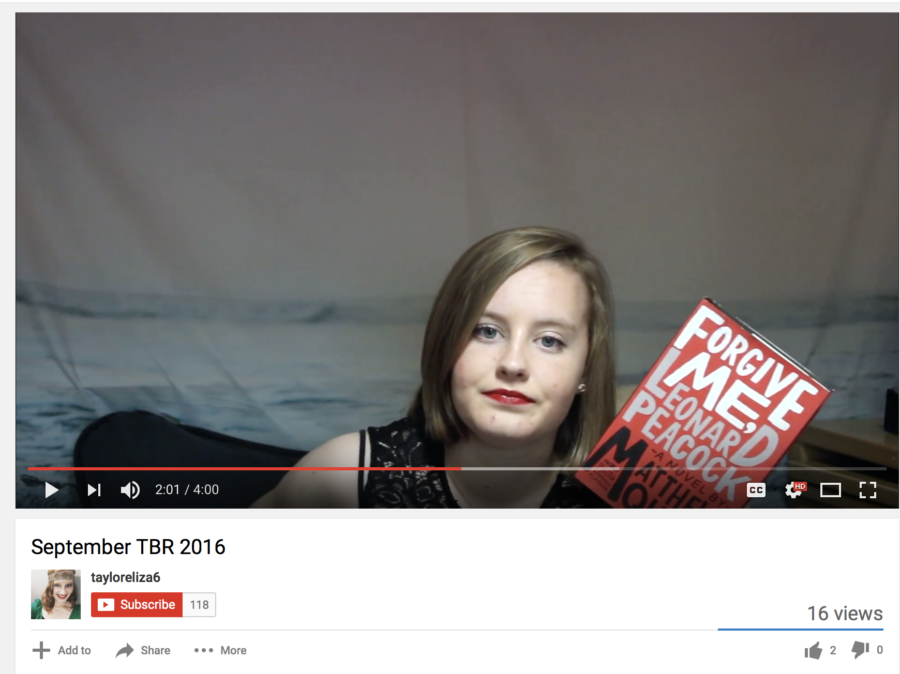YouTube demonetization policy devalues speech
UNI freshman Taylor Leien’s “BookTube” YouTube channel is subject to what columnist Barikor considers a dubious demonetization policy.
Sep 22, 2016
Imagine if there was a dollar amount attached to every word that you said. As a member of the Northern Iowan staff, the currency of my words is that apparent to me. Besides print journalism, there are many different forms of speech people can make money from, including the highly popular format of YouTube.
Taylor Lien, a freshman English and digital media leadership major, is committed to YouTube, but not for the financial aspect of it.
“It’s just a really neat community,” Lien said. “There are so many things that I didn’t really know existed until I got into BookTube and YouTube in general.”
Lien started her channel in 2014, but has been using the platform regularly since 2012. Lien discovered her niche in BookTube – a section of YouTube devoted solely to all things concerning books and their adaptations.
“I have haul videos where I basically just talk about books that I buy,” Lien said. “I’ve read a little bit of everything and if I haven’t read it I’ve probably heard of it.”
All the topics Lien discusses on her channel come from outside sources, as do other YouTube videos — that has been a long-standing problem.
YouTube is dependent upon content creators like Lien to bring people to their platform, but issues of fair use and copyright claims hurt this relationship. Fair use, defined in the US copyright laws, allows copyrighted content to be briefly quoted as long as it is followed by analysis of some sort like with news reporting and criticism.
Cases of videos being demonetized due to dubious copyright claims finally led to YouTube amending their policy April this year to allow monetization of videos during copyright disputes.
The most recent policy change to spark outrage from content creators is the new alerts about video demonization. This means videos were being demonized before, for advertisement reasons, but YouTube wasn’t making people aware of it.
“I really didn’t know anything about it and I really don’t think that any of the bigger creators did,” Lien said. “There were a lot of people it really shocked to know that videos were getting demonetized and people that were making their living off of this were losing money because YouTube wasn’t telling them that their content was ad friendly.”
I can only imagine what it would be like to be in her shoes; to finish an essay, for example, and then get handed the complete list of requirements needed to get the full amount of points. Not only did no one know they were losing money, they didn’t know why so there was no way to prevent it from happening.
As for prevention, YouTube’s policy lists a lot of things as not ad friendly including: sexual humor, inappropriate language (i.e., profanity and vulgar language), promotion of drugs and regulated substances and controversial or sensitive subjects and events (i.e., war, political conflicts, etc.).
Lien was quick to point out that a lot these topics that are becoming subjected to demonetization are things you’d see on the local nightly news.
“They need to tighten down on what they deem appropriate because right now it’s rather a large category,” she said.
Forget a penny for your thoughts, if they’re controversial they might as well be worth nothing on this algorithm. This particularly hurts up and coming YouTubers or YouTubers without a large enough audience to be able to pursue multiple revenue streams, according to Lien.
Although YouTube is well within their rights to make this move, as a non-traditional media outlet, Lien doesn’t understand why they would want to subject themselves to a traditional media model. I certainly think that with issues of fake copyright claims already being used against content creators this opens up a Pandora’s box of punishing people for voicing their thoughts on any given topic.
It boggles my mind that the biggest algorithm-making site, Google, could have so royally messed up with creating a fair algorithm for YouTube that fits the unique platform and meets everyone’s needs. But Lien is far more hopeful than I am in those regards. I guess my dollar isn’t on the line here, but if my words were my only source of currency, I would fight anyone who tried to tell me what they’re not worth.

















